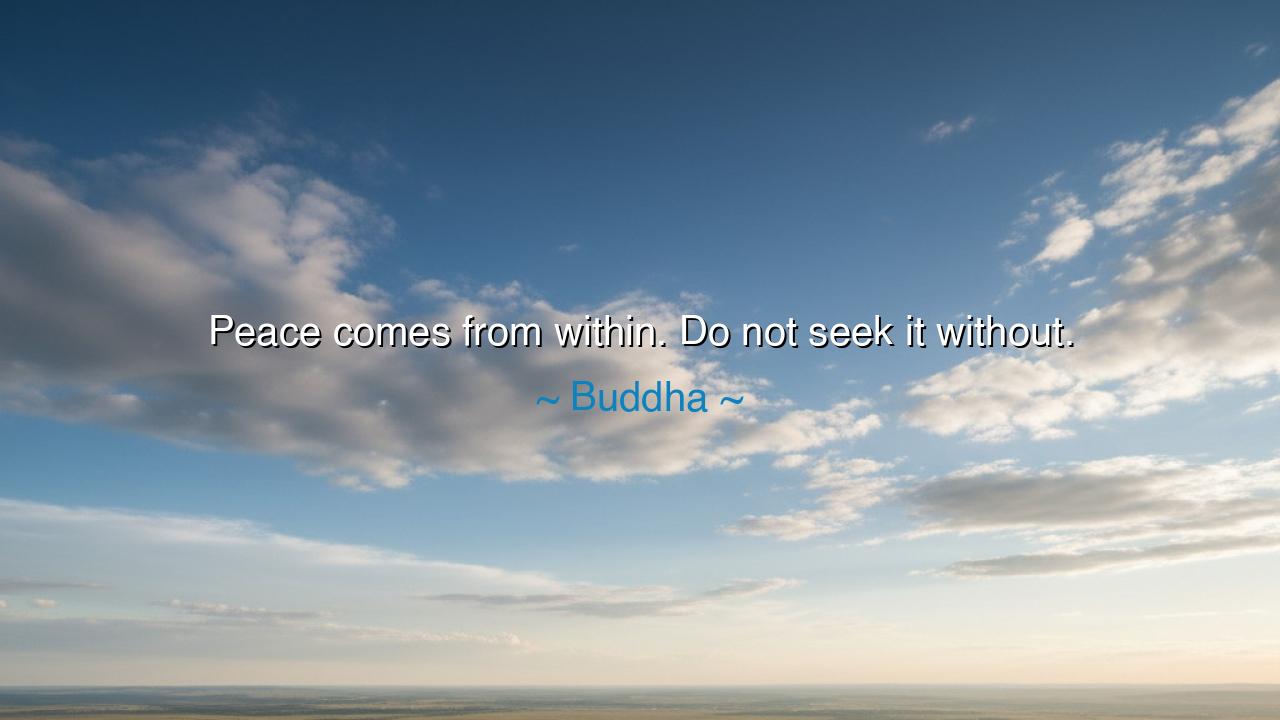
Peace comes from within. Do not seek it without.






Hear the timeless teaching of the Buddha, who declared: “Peace comes from within. Do not seek it without.” These words are a lamp unto the weary, a call to those who wander in search of calm in the noise of the world. For men and women, blinded by desire, often believe that peace lies in riches, in power, in conquest, or in the approval of others. Yet the Buddha, with the clarity of enlightenment, reminds us that such treasures are fleeting shadows. Peace is not a jewel hidden in the markets of the world; it is the flame already burning in the heart.
Mark this, O seeker of wisdom: to search for peace in external things is to chase a mirage in the desert. The cup of wealth will empty; the crown of power will grow heavy; the embrace of others will fade. If one’s peace rests on these, then one’s peace will perish with them. But if one turns inward, stilling the mind, quieting desire, releasing attachment, then one discovers a treasure that no thief can steal, no storm can shake, no death can destroy. This is the eternal truth of the Buddha’s words.
Consider the Buddha’s own story. Born as Prince Siddhartha, he had all the riches of the world—palaces, jewels, attendants, and pleasures. Yet despite these, his heart was restless, for he saw suffering and death, and he knew that no earthly abundance could shield him from life’s impermanence. He renounced the wealth of kings, sat beneath the Bodhi tree, and turned inward. There he found what no crown could grant: enlightenment, a peace unshaken by sorrow or joy. From his life we learn that the origin of peace lies not in circumstance, but in the discipline of the soul.
History offers further witness. Think of Marcus Aurelius, emperor of Rome, ruler of vast armies and lands. Surrounded by luxury and burdened with responsibility, he turned not to the Senate or the sword for solace, but to his own meditations. In the quiet of his inner reflections, he found wisdom and calm. His writings echo the Buddha’s teaching: that peace is found in the mastery of the self, not in the mastery of the world.
But let us not mistake this teaching as an excuse for passivity. To say “peace comes from within” is not to withdraw from life, but to engage it from a place of strength. The one who is inwardly at peace can face the storms of the world without fear. He can meet insult without anger, loss without despair, victory without arrogance. He becomes a still lake, reflecting the world clearly, unmoved by its turbulence. Such a person does not depend upon the shifting tides of fortune, for his anchor lies within.
The lesson for us, O listeners, is plain and urgent: stop searching outside yourself for what can only be found in the silence of your own heart. Do not say, “When I am richer, then I will have peace,” or, “When others approve of me, then I will rest.” Begin now, with what you are, where you are. Sit in stillness, breathe, forgive, release. Train your thoughts as a gardener tends his soil, uprooting weeds of anger and planting seeds of compassion. For as the Buddha taught, the world outside will never give what the soul has not first found within.
Therefore, let your life be guided by this eternal law: seek not peace in possessions, nor in praise, nor in fleeting pleasures. Instead, look inward, and cultivate it as a flame in your heart. For when the heart is at peace, the world itself is transformed, no matter its storms. And when you walk in such peace, you not only bless yourself—you bless all who cross your path. Truly, as the Blessed One declared: “Peace comes from within. Do not seek it without.”






AAdministratorAdministrator
Welcome, honored guests. Please leave a comment, we will respond soon